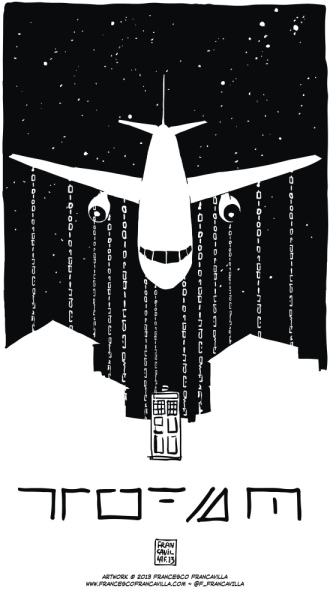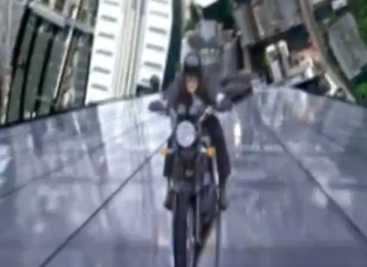The Bells of Saint John

Image by Francesco Francavilla
"This whole world is swimming in Wi-Fi. We are living in a Wi-Fi soup. Suppose something got into it. Suppose there was something living in the Wi-Fi, harvesting human minds... human souls trapped like flies in the world wide web."
Written by Steven Moffat
Story 7.07
Transmitted 30 March, 2013
Doctor Who is an incredibly popular TV series with a fan following that grows bigger every year. A series that was once the punchline to any put down joke, it now graces the covers of pop culture magazines not just in the UK but in the US as well. BBC America has taken a very active role this year in promoting Doctor Who, just in time for its fiftieth anniversary by showing weekly installments of past episodes from the early days and offering up the opinions of the cast and crew of the current iteration. The seventh season is the most anticipated in a long time as it strays from the path of the Amy Pond story and into uncharted territory with a grand cinematic celebration at the end.
I have been watching Doctor Who for far too many years to remember and I have been running this blog since 2007. There are some regular readers who are here reading the latest in a long line of reviews. There are also some of you who have stumbled upon my blog because you are a Doctor Who fan, full of excitement and joy for your favorite series. You will likely not be pleased with much of what I have to say.
I am not a fun squasher, so if you don't want to read about your favorite program getting dissected and criticized, I highly recommend going to one of many other review sites. I love Doctor Who and continue to watch every episode I can because of I love it... but when I find fault with the series I can get a bit salty.
So... consider this a friendly warning.
And if you are still reading and disagree, feel free to voice your opinion but don't expect a heated argument because I'm just not interested.
All good? Lovely.
Ever since it returned in 2005, the BBC Wales version of Doctor Who has been obsessed with a very specific period of the program, specifically the first story of the eighth series. When the Doctor became stranded on Earth, the focus changed drastically from fantastical to the factual. The sci-fi elements were grounded in the every day things around us and made horrific. The best example of this is in Terror of the Autons in which the Master teamed up with the Nestene Consciousness to take over the planet through the animation of anything made from plastic. This was mainly a rehash of the previous year's opener 'Spearhead From Space' but much goofier. In Spearhead, animated mannikins stalked the streets and entered houses, destroying anything in their path. In Terror, one executive was eating alive by a bean bag chair, another throttled by a doll while the Doctor was nearly garroted by a telephone line. Likewise, the new series has attempted to take everyday things and make them into terrifying fantastic horrors, be it shadows, statues, cellular phones, GPS or even Wi-Fi.
I wager at least half of all new Doctor Who stories have something in common with Terror of the Autons except for one thing; Terror of the Autons was actually a clever story that, while being on the absurd side was still clever and innovative. It softened the Quatermass-influence of series seven and replaced with a more comic strip-style version of Doctor Who but it still worked. The BBC Wales version, in comparison, is much more topical and disposable.
Even the War Machines, a story from 1966 that was about a computer intelligence taking over the world was more plausible than The Bells of Saint John, and it was written with a small portion of the information available to the current series regarding technology. The War Machines was written with the input of Kit Pedler, the scientist whose interest in real world cybernetics led to the creation of the Cybermen.
The Bells of Saint John is written with all the intelligence gleaned by a cursory glance through wikipedia. It has hardly any idea what the internet is or how it works, let alone the common sense regarding Wi-Fi connections and security. Proof behind this is that only after Clara references Twitter does the Doctor acknowledge she has some kind of enhanced technical intelligence.
Award-winning author Steven Moffat has this amazingly flawed view of Doctor Who in that it is all about the companion and not the Doctor. He also views Doctor Who as a fairy tale. Neither of these things is problematic in itself. I quite like series five which was Moffat's first year as producer and head writer and was almost entirely as companion-centric and fantasy-based. However, this story has lots of problems, especially given that Amy Pond was arguably the hub of the past three years and once she is gone she is replaced by Clara, the mystery girl who the Doctor is chasing through space and time.
Last year, the Doctor met a strange girl named Oswin who was trapped inside of a Dalek. In that adventure she died. The Christmas Special saw her return as a governess in Victorian London, where she also died. In the series seven point two mini-episode, we saw the Doctor meet with young Clara Oswald at a playground. At the opening of The Bells of Saint John, the Doctor is camped out in a monastery waiting for 'The Bells of Saint John' to ring. The bells are actually attached to the phone in the outer shell of the TARDIS, and the ringing is caused by Clara calling for tech support in the 21st Century where she is wondering 'where the internet has gone.' The fact that Clara is unable to connect to the net is seen as the entire web disappearing is rather suspect. Even my mom would not jump to that conclusion. I venture to say that each of us has had this kind of problem at some point and did not think that somehow the web had gone away. In any case, this is all connected to a weird alien Wi-Fi signal being used to suck people into the web and drain their minds.
Yes... the evil weird threat is Wi-Fi.
This slideshow requires JavaScript.
Users are somehow downloaded into a server (with a cute progress bar showing the process) where they become vloggers warning people to stay offline and scream to be let go. How a webcam can be used to not only scan but download your consciousness is beyond me, but why would the result be a tiny TV screen of the poor victim screaming to be let go? Who wants that? The evil corporation who is behind all this mutely works away in a room dominated by a wall of screaming faces... every day. From the revelation at the end of the episode, this has somehow been going on for decades.
Just imagine what that job is like?
It must be Hell finding people to work at EvilCo (or Shard, but I think EvilCo is better), since the average employee is an imbecile and HR doesn't monitor their web usage. The absolute raving idiocy that members of a super secret organization would not only use social networking sites but also note said employer and are online while working on their is almost laughable.
The intelligence of all these people is being siphoned by some unknown source... much like another classic story The Krotons in which the aliens sapped the minds of the brightest and converted it into raw energy. In this case, Shard has been at this for quite some time (begging the question why did the Doctor take so long to stop them) and yet it is unclear what the aim is. The plot is incomplete, much like The Idiot's Lantern in which the Wire is sucking people through televisions but never explains why.
The Doctor and Clara team up using a laptop to take down the evil organization while the Doctor muses over who and what Clara is and why he keeps bumping into her. Wi-Fi is depicted as being so powerful that it can shut down whole city blocks and almost crash a jet into the suburbs... or take control of a cafe to show the Doctor how powerful they *really* are. That is impressive.
All of this is somehow tied into 'The Great Intelligence' from The Snowmen Christmas Special which is interesting, but shouldn't we be seeing Sir Ian McKellen and not Richard E. Grant as REG was the human host and Sir Ian is the real baddie? And is this the same 'The Great Intelligence' from Classic Doctor Who? I'm starting to wonder.
The Doctor not only hacks the Shard's technology but also uses an anti-gravity motorcycle to drive up the side of the corporate office to confront them.

There is a saying in TV, 'jump the shark' to mark when a program has achieved such a status of badness that it is beyond any other words. The Doctor jumped a building. If one can say that he jumped the shark as well, I don't know... but this was pretty embarrassing both conceptually and visually. The effect was so poor, I can only imagine what it looked like on hi def.
The Doctor does his usual grand-standing to the baddie, but seems to have no real interest in the safety of anyone but his companion. This is very similar to The Idiot's Lantern when the Doctor confronted the Wire for Rose's freedom. When the Great Intelligence finally releases its hold and retreats, it is implied that the bodies of those previously trapped in the system may well be dead. When the Great Intelligence's latest mouthpiece, Miss Kislet, is released, she tragically becomes an innocent little lost girl trapped in the body of a sixty year old woman... isn't that nice?
The Doctor could care less about any of the damages, though, and is eager to fly off with his latest in a line of feisty females in what Clara calls his 'snog box.' Possibly the dumbest story to date, this is the 'Idiot's Lantern for Idiots.'
I will once again point out that Matt Smith is in fine fighting form and managed to take some of the worst dialog ever written and make it sound at least palatable. I'm still on the fence regarding the new companion played by Jenna-Louise Coleman. She seems to get by on being cute as a button... but that will get very old very quickly. The camera work was unusually superb with some lovely cinematography with the motorcycle ride into London a stand out moment.
But, largely this story was far too concerned with the companion and presented a juvenile and silly view of reality that could only be called 'fantasy' to save it from being called out as laughably poor. This is the same program that produced stories as otherworldly as Kinda and as dramatically impressive as Talons of Weng Chiang with ludicrously limited resources. Even so, this was once a TV show screened late at night on PBS stations, a show whose name prompted laughter and ridicule.
To return to where I started, this is an incredibly successful program at arguably the peak of its popularity. It should be better than this.
Wi-Fi? Seriously?
Next time: The Rings of Akhaten




